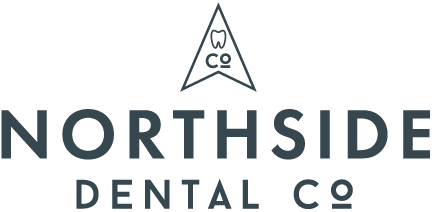Dentists frequently encounter patients who unknowingly struggle with bruxism, also known as teeth clenching or grinding teeth in sleep. And when left untreated, bruxism can cause dental issues requiring extensive and expensive treatments.
Let’s take a closer look at bruxism, including why teeth clenching occurs and how to stop clenching jaw at night with the help of a trusted dentist.
Why Do I Grind My Teeth In My Sleep?
Bruxism — the dental term for grinding your teeth and clenching your jaw — can occur during the day but is most common at night. Most affected people aren’t aware they’re doing it until signs and symptoms manifest, such as grinding teeth pain, a sore jaw, headaches, and sleep disruption.
It can be difficult to pinpoint a single cause of bruxism. However, common risk factors include:
- High stress levels
- Genetics
- Irregular sleep patterns
- Lifestyle choices
- Medications
Why Do My Teeth Hurt From Grinding At Night?
Nocturnal bruxism is like placing your teeth under a nightly stress test. In fact, teeth clenching can exert up to 250 pounds of force on your jaw! The recurrent pressure from clenching and grinding can lead to a host of dental issues.
- Tooth Wear: Constantly clenching and grinding your teeth can lead to enamel loss, which is the protective outer layer of the teeth. As the enamel wears away, the underlying dentin layer becomes exposed, leading to tooth sensitivity, especially when consuming hot, cold, or sweet foods and drinks.
- Microfractures or Cracks: The excessive pressure exerted on the teeth during grinding can cause hairline fractures or small cracks in the enamel. These cracks may not be immediately visible, but if left untreated, the cracks can deepen and lead to more significant dental problems.
- Gum Recession: Bruxism can also contribute to gum recession, where the gums gradually pull away from the teeth, exposing the roots of your teeth. These tooth roots are sensitive, causing discomfort or pain if they aren’t protected by your gums.
- Dental Fillings or Restorations: If you have dental fillings, crowns, or other dental restorations, the constant grinding can put additional stress on these restorations. Over time, this can cause them to weaken, crack, or become dislodged, leading to tooth pain or sensitivity.
- Jaw Muscle Fatigue: The excessive muscle activity involved in grinding can lead to fatigue and soreness in your jaw. This pain can also radiate from the jaw muscles to the teeth, causing them to feel tender or hurt, and your head, causing headaches.
It’s important to note that everyone experiences symptoms differently, so if you think you may have bruxism, be sure to speak with your dentist. They can diagnose you and help you find the best treatment for your specific needs.
Bruxism Treatment Options
Learning how to stop grinding teeth at night is imperative to preserving the integrity of your teeth. There are various strategies to help you stop grinding your teeth at night and ease the pain associated with this bad habit.
Mouthguards
A common treatment for bruxism is having a mouthguard, also called an occlusal guard, custom-made to protect your teeth overnight. These mouthguards create a barrier between your upper and lower teeth, reducing wear on your teeth.
Botox
Another bruxism treatment option is localized and targeted Botox injections. Botox relaxes your jaw muscles to reduce clenching and grinding, which provides relief to your teeth, jaw, and head.
Behavioral Therapy
Since stress can be a cause of bruxism, cognitive behavioral therapy is an effective treatment for it. This type of therapy helps individuals learn healthy coping mechanisms, practice relaxation techniques, and make lifestyle changes that can help reduce stress and anxiety.
With modern technology and personalized treatment plans developed by dental professionals, managing your bruxism is within reach.
Northside Dental Co Can Help You Stop Grinding Teeth In Sleep
Many suffer from the ongoing symptoms of bruxism. But with proper treatment and guidance, you can minimize clenching your jaw and grinding teeth in sleep and enjoy a healthier and more comfortable smile.
At Northside Dental Co, our individualized treatment plans focus on identifying the root causes of your bruxism and addressing them head-on, so you can find relief and protect your teeth from damage.
If you suspect you or a loved one is dealing with bruxism, book an appointment at Northside Dental Co. Our knowledgeable team is committed to helping you sleep better and protecting your beautiful smile!

